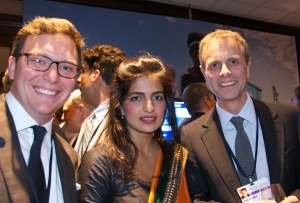
When I flew to Mexico City, I knew that I would meet amazing people. I didn’t expect, however, to reconnect with one of these people, a young man committed to social impact, less than a month later in Cairo. How is this possible in today’s fast-moving and ever-changing world? The answer is Hult Prize, the world’s largest social impact movement.
 I was in Mexico City for 1 of 15 Hult Prize regional finals. Inspired by the culture in Mexico, I not only attended the regional competition, but I participated as one of the 9 esteemed judges. As I sat in the judge’s room, Abe and his co-founder blew us away with his idea to Harness the Power of Energy to Transform lives. Their idea utilized a patented technology to pull water from the air and provide it as an essential resource to refugees.
I was in Mexico City for 1 of 15 Hult Prize regional finals. Inspired by the culture in Mexico, I not only attended the regional competition, but I participated as one of the 9 esteemed judges. As I sat in the judge’s room, Abe and his co-founder blew us away with his idea to Harness the Power of Energy to Transform lives. Their idea utilized a patented technology to pull water from the air and provide it as an essential resource to refugees.
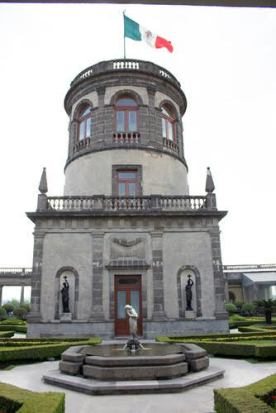
Sounds simple? Well, it wasn’t, and perhaps that’s why Sam’s team didn’t win, despite going through the regional competition in Mexico as a finalist. Slightly disappointed, the judges and I rallied around Sam, and urged him not to give up. “We love your idea,” we said. “Keep going, but take with you a few tips, recommendations, and introductions. Consider them and come back to us.”
The full impact of our words might not have occurred to Sam. An open and intelligent listener, he went on to compete in the first ever Hult Prize Egypt National program on June 1st, where we met again. I was a keynote in Egypt, and traveled there from Montreal days after losing my father in NYC. Why would you make such a big trip while in mourning? I explained that my father would want me to follow through on my commitments. He would also say that you get your energy from people – and from inspiring youth to lead a life of impact.


At the start of the Egypt nationals, I was invited to share an inspirational speech with the competitors. Sam was in the room, surrounded by young Egyptian competitors, many of whom are now committed members of the social impact movement I love. His mother, Gihan Salib, was also in the room.
The program took place during Ramadan, and our sunset dinner was unique, all of us breaking the fast together. As I walked into the open air dining room at the American University in Cairo, I saw a woman my age smiling up at me. I knew that we had to share dinner together. It was Sam’s mother, who said, “You have changed my son’s life by believing in him when he lost in Mexico City. You lifted his spirit and inspired him to move forward. You have to believe he is one of many people whose lives you have changed for the good.”
Unfortunately, Sam lost in Egypt too, but he was not as concerned. We spent the following day together touring the Pyramids (his first time there too), riding camels, shopping for local gifts, and sharing our vision for life and the future.

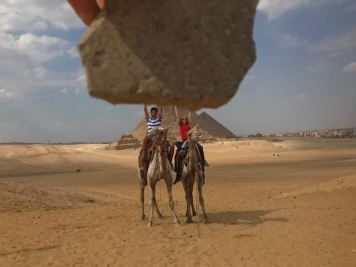
 For those who are reading this, life has many twists and turns. Losing can mean winning. And sometimes winning takes on an entirely new meaning. I now have a friend for life who inspires me, and Sam has a new journey, one that will be my joy and privilege to guide, and to share in his successes. This is only the beginning of a very long road together. How amazing is that?
For those who are reading this, life has many twists and turns. Losing can mean winning. And sometimes winning takes on an entirely new meaning. I now have a friend for life who inspires me, and Sam has a new journey, one that will be my joy and privilege to guide, and to share in his successes. This is only the beginning of a very long road together. How amazing is that?
I recently had the wonderful opportunity to reconnect with Sam and interview him about his experience in the competition. Here is a little bit more of his story:
Tell me about your Hult Prize Idea and how you got funding to travel to Mexico City.
Me and my team had initially dabbled with multiple ideas from ones involving disciplines of aquaponics to others that were intended to enhance public transportation efficiency. After spending quite some time brainstorming, we decided to settle with the business idea that we viewed to be most feasible, profitable, and fit to this year’s Hult Prize challenge, harnessing the power of energy. The idea was simple. We had developed an approved schematic flow diagram of a device that was to be installed in off-grid areas to generate water and electricity from atmospheric humidity for distribution to energy- and water-destitute areas. The plan was to develop many units of this device to be rented out or sold to construction companies who carry out off-grid construction projects and use the profit to develop similar units for refugee camps in the Middle East and other off-grid communities in Africa. Refugees receive little power and water supply. Accordingly, the refugee camps of Azraq and Zaatari in Jordan were our intended pilot. As for how we were funded, we first sought support from our university. Seeing as there is no formally dedicated department for such cases at our university, I took it upon myself to meet with the president of the university. He was not easy to reach, so I had to set an appointment multiple times but only ended up meeting with his secretary. When a “no” was received, we decided to go to the department of student activities where I suggested that we could use Hult Prize@GUC as an active working group (AWG) to raise the money (since raising money as students who don’t belong to an AWG is prohibited on campus). That, too, was met with refusal. Fortunately, we worked in parallel in search of funds outside the university by seeking support from companies who listened to the idea. Finally, we managed to get one construction company to fund the trip and accommodation after pitching our idea.
 What happened in Mexico and what obstacles did you have to overcome?
What happened in Mexico and what obstacles did you have to overcome?
Obtaining the funds needed to get to Mexico was the biggest obstacle. Arriving in Mexico City on March 15th marked the endpoint to 30 hours of travel time from Cairo. Direct flights were not available, and even if they were they would have been too expensive. That said, we experienced one other hurdle when we got there. While rehearsing for our presentation for one final time, we were surprised to find out that our Powerpoint file was corrupt and wouldn’t open. Consequently, we had to refurbish our presentation from the data we already had at the expense of missing orientation day on the 16th after having contacted Hult Prize volunteers informing them of what had happened. Fortunately, we had enough time and were able to pull an all-nighter for competition day!
What were the judges like? Can you share some stories about your interactions with them?
After pitching in the final venue (we were the last team of 6 to pitch) and after the judges’ deliberation, we managed to talk about half the judges. As one might expect, they were extremely critical as needed. If I could describe them additionally in one word, it would be constructive. We sought advice from them on what we needed to improve and received the most insight from Colonel Eric Rojo, Sheryl, Andrea from Protrash, and Mrs. Mariuz Calvet from the Mexican bank Banorte. Additionally, I got to share a very stimulating, thought-provoking, futuristic conversation with Ahmad Ashkar, the CEO of Hult Prize, about new and upcoming technologies while on our 10 minute bus ride from the Chapultepec castle (the only castle in South America)!
 After leaving Mexico, what did you do to prepare for the Egypt Nationals?
After leaving Mexico, what did you do to prepare for the Egypt Nationals?
After leaving Mexico, I broke down our tasks into milestones. With a rough business model ready, I worked on further development of the business plan while assigning the task of developing of a prototype to a team member. These would be the first two milestones. I also reached out to several NGOs for partnership. They were intrigued by our idea and shared our vision of energy sustainability and impact. I also outsourced a video editor to help create a video about AquaElectro’s endeavours for the Wild Card application.
How has this experience changed your life?
Hult Prize has been an amazing journey. After coming across a small on-campus booth by chance and applying because why not, I never thought I would end up in Mexico City integrating me and my team as part of the global change. Although competing and being runners-up was all part of a wild adrenaline rush, I am more proud of helping propagate the impact the foundation has on the world at large. I’ve gotten to know so many great people, organizers and competitors alike, with a common desire to change the world for the better and a fiery, youthful spirit. The connections I gained the past 6 months have been a priceless addition to my network of people! Moreover, one of the most prominent features of the community is multiculturalism, an environment in which I found myself thriving.
What are your next steps in your life’s journey?
I am currently applying for graduate studies abroad in molecular medicine or a related field, and I envision being heavily immersed in the biotechnology and genomics industries. I hope to work for companies like Johnson & Johnson or Genentech, which are like the pioneering tech companies of the biotechnology sector. The market is currently thriving, and I predict more and more disruptive products coming to market that will change our perception of diseases like cancer to say the least. After gaining enough experience in the industry, I hope to start my own biotechnology startup company with a primary goal of developing and commercializing medical solutions for the diagnosis and treatment of diseases that are otherwise difficult to deal with.
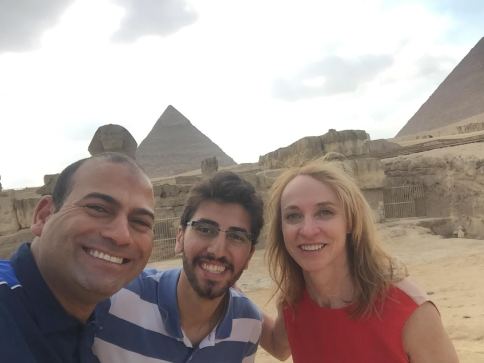
What can I and others like me do to help the youth lead lives of impact?
I believe meeting Sheryl for the first time in Mexico City was one of the early moments of impact for me. I’m already inspired by the blogs she writes and by the fact that she is making her dad proud continuing to inspire young people like myself with her positive spirit! Uplifting is the word I would use to describe Sheryl and other agents of change at Hult Prize. With blogs like this and new expansions to the foundation (like the council), I think the influence will be not only far-reaching but also exponential from year to year. It’s amazing to see how this reach has grown over five times compared to 2017.
Is there anything else you want to share?
Yes! The Hult Prize experience has truly contributed to my personal growth intellectually and socially. It reinforces the growth mindset I choose to adopt and for that I’m sincerely grateful. It’s also an honor of mine to be featured in your blog and I want to express many many thanks to you for considering me!
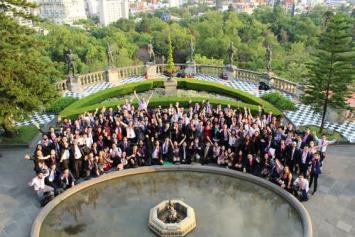

 Name:
Name: 
 Why is Hult Prize important to your Country?
Why is Hult Prize important to your Country?
































